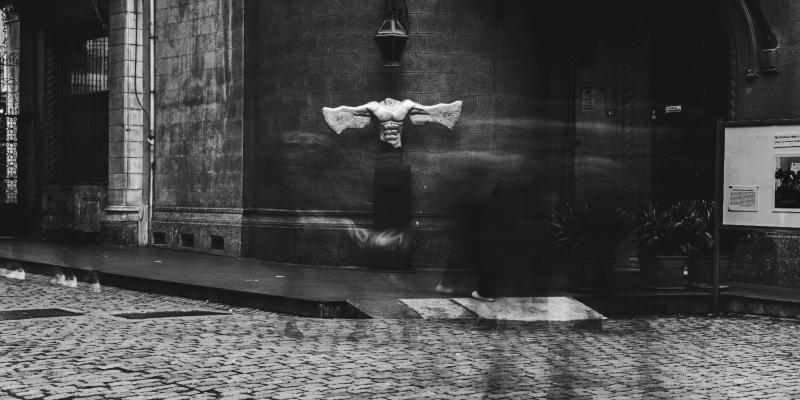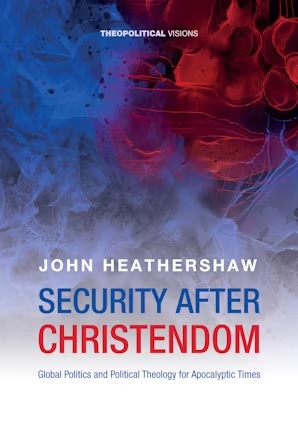Christian hope for a world in crisis
The church has a crucial role to play in responding to today's security challenges, writes John Heathershaw, but we need to develop new answers. Here are three suggestions

Why is the leadership of the Russian Orthodox Church supporting Putin’s horrendous war against Ukrainian believers? Why is the international community unable to take serious action against climate change and what should the church do in its absence? What does the migration crisis tell us about the changing nature of the world and why is it usually wrong for the church to support “strong borders”?
These are some of questions addressed by my new book Security after Christendom published by Wipf & Stock in February 2024. They are new versions of old questions about security. But the answers that we have long held to these questions – Christian political ideas like “just war” and “a Christian country” – no longer seem convincing. To come to better answers, we need what John Stott called “double listening” – hearing from scripture and Christian tradition on the one hand and from our knowledge of the world and the exercise of reason on the other.
Security after Christendom contains both orthodox biblical theology and practical examples from my research and my first-hand experience of politics. It argues that the reason our answers are no longer convincing is not because Christianity is in decline – on a global scale, it’s not – but because these ideas were never truly Christian. Rather, they were those of Christendom: ideas of intimacy between church and government where the church ministers to government and government secures the church.
These ideas have held sway across Western Christianity for most of the period since the fourth century when Constantine embraced the church and Christian leaders accepted the privileges of the Roman empire. Today they are often understood in national terms – that’s how the Russian church supports Putin, come what may. The demise of this idea and its institutions is not be lamented but to be celebrated as an opportunity to recast the Christian idea of theological and political hope for the world.
The book has three parts. The first shows how Christendom wasn’t just about popes and crusades but has taken different forms in East and West, North and South. It’s been most consistently practised by the churches of the Christian East.
In the South, Christendom was often experienced as missionaries followed in the footsteps of brutal colonial rule or wars of conquest like the invasion of Ukraine. Key Christendom political ideas include the “balance of power” between nations (which is drawn from a speculative reading of 2 Thessalonians 2:6–7 which is influential in the Kremlin) and “just war” (often proof-texted to Romans 13:1-7 but which has no clear biblical basis). For today’s Christian world, located mainly in the global south, these are understood as justifications for violence and oppression by government.
The second part explores what history, philosophy and the social sciences tell us about these dramatic shifts of globalisation and secularisation. Drawing on Christian thinkers like Charles Taylor and David Martin, the book argues that the secular age has decisively arrived but is essentially unstable.
The disenchantment of the world that Taylor narrates over the last 500 years is unsatisfying. It has been met by various forms of re-enchantment including varieties of religious nationalism (Christian, Muslim, Jewish, Hindu, Buddhist etc). Some atheists want to be “cultural Christians”. Moreover, attempts to recentre the world on the secular state have also been defeated by the forces of global capitalism. Today, private power is often far greater than that of national interests and public institutions.
The final part of the book begins with a comparison of Romans 13 and Revelation 13 through the hermeneutic of “powers theology”. The two texts seem to give dramatically different accounts of the role of government – from a legitimate, God-given institution in Romans to a demonic force in Revelation. (How) can the two be reconciled?
This is an apocalyptic question about the relationship between the breaking of the church into history and the ultimate ends of the world. By modelling a different kind of community, the church is meant to challenge and ultimately replace the remedial institution of government. Some governments will remain limited, as Romans envisages. But this unveiling (apocalypse), reveals the true character of those who obsess about “national security” and “taking control”.
From this biblical and theological basis, Security After Christendom develops a new answer to the security challenges raised by our world in crisis. The answer is three-pronged and in each case includes what the church must do itself and what it must witness to the world.
First, the church must be and must proclaim radical inclusion; that is, a genuinely multinational and multicultural fellowship of all believers whose citizenship is in heaven.
Second, the church must be and proclaim nonviolent protection; it must root out the justification of violence within and without the church, witnessing to the historical truth that war rarely works, and that the utility of military force is limited.
Third, the church cannot wait for government to create just economies and protect the environment but must model abundant provision; this means a church which models approaches to travel, food and the use of resources based on voluntary poverty and generosity to others.
 The book’s argument is global but local. The exact way these three Christian political principles – radical inclusion, nonviolent protection, and abundant provision – are carried out will differ from place to place.
The book’s argument is global but local. The exact way these three Christian political principles – radical inclusion, nonviolent protection, and abundant provision – are carried out will differ from place to place.
They may seem a bit general or insufficient for a world facing environmental catastrophe or the risk of World War Three. Shouldn’t we just focus on the gospel and pray for leaders to make the right decisions about politics? But this is perhaps to remain stuck in a Christendom mindset where security is a matter of government rather than an approximation of the peace (shalom) of God.
And the church is a big country. There are more citizens of Christ than of India, China, or any nation. They undertake thousands of initiatives to improve security from sanctuary churches to accompanying vulnerable citizens in warzones.
Baptists should understand the problem of intimacy between church and government and the need for a radical alternative. It was an English Christendom state which persecuted non-conformists for centuries.
To Baptists today, the message of Security After Christendom is deceptively simple: stop thinking of the secular world as something to be opposed and start thinking of it as something to be remade through a gentle and generous Christian political witness. In practice, this involves a bit less doing and a lot of listening both to God and to others.
Image | Yigit Karaalioglu | Pexels
John Heathershaw is Professor of International Relations at the University of Exeter, a member of Pinhoe Road Baptist Church in Exeter, and the author of Security After Christendom (Wipf & Stock, 2024)
Do you have a view? Share your thoughts via our letters' page.
Baptist Times, 01/05/2024